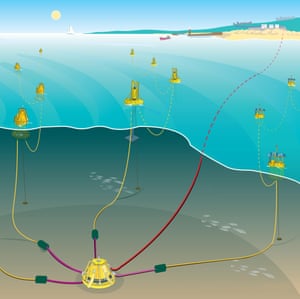
The EU is proposing to spend hundreds of millions of euros to help the budding ocean energy industry to provide a tenth of the bloc’s power by 2050.
The boost would take the form of a €250m investment fund, with an additional €70m set aside for insurance, loans and guarantees, according to the roadmap for channelling the potential of wave and tidal energy.
The money would be supplied by the EU and its member states and should work as a buffer for companies that are attempting to cross the “valley of death” between demonstration projects and the energy market.
“It is a comprehensive, inclusive and ambitious plan for building up ocean energy in Europe – from the initial R&D all the way to the industrial roll-out,” said the EU’s environment commissioner, Karmenu Vella, at a launch meeting in Brussels.
Rémi Gruet, the CEO of trade group Ocean Energy Europe, said: “Bridging the gap between risk-averse commercial lenders and public authorities with limited budgets requires rethinking project finance. The roadmap proposes just that, solutions fit for the purpose of reducing risk and unlocking capital: milestone-bound grant awards, guarantees and insurance.”

In further good news for the sector, Carnegie Wave Energy in Cornwall announced that it had secured £9.6m of EU funding that would enable it to connect England’s first commercial-scale wave power project to the grid.
A 15MW array at Cornwall’s wave hub centre should now be commissioned in 2018, before commercial deployment in 2021.
The local MP and former environment minister George Eustice, who campaigned for Brexit, said that the news showed that Cornwall was “well positioned to play a significant role in securing the UK’s continued reputation as a market leader in offshore renewables.”
Around half of the world’s wave and tidal energy companies are today based in Europe, and officials believe that the industry could generate up to €653bn by mid-century, with an annual market of €53bn.
Four projects currently in the pipeline are slated to provide 1.5GW of energy capacity and industry spokespeople say that 400,000 jobs could be created.
Later this year, Atlantis Resources will complete the first phase of a 6MW MeyGen project in Scotland, which will be ramped up to 86MW before reaching a full generating capacity of 398MW in 2025.
Tim Cornelius, the company’s CEO said: “Atlantis has 640MW in our Scottish portfolio alone, the realisation of which represents nothing less than the creation of a new manufacturing sector for Europe based on predictable, reliable, renewable energy.”
In Northern Ireland, DP Energy says it is in the advanced stages of developing a 10MW tidal farm in Fair Head as the first stage in a 100MW project. The firm’s wider ocean energy portfolio adds up to 330MW.
A separate EU ocean governance package on Thursday will launch several programmes to protect the world’s water bodies, including a pilot project using satellite communications to track illegal fishing worldwide.
